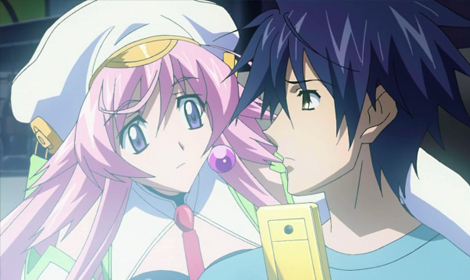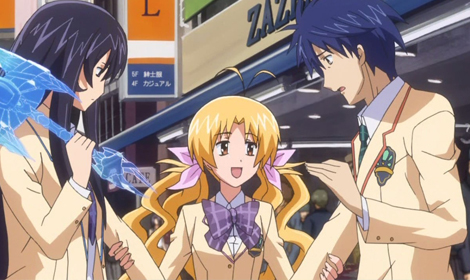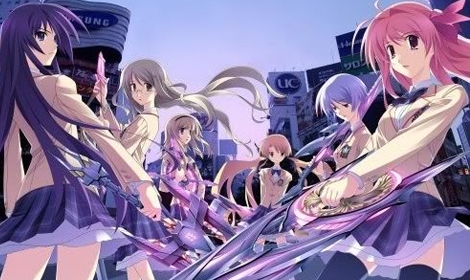If you had the power to delude anyone into seeing the world the exact way that you want them to, what would you make them see? Studio Madhouse's (the Girl Who Leapt through Time, Chobits) adaptation of Nitroplus' (Demonbane, Saya no Uta) 2008 visual novel Chaos; Head, the first entry into their dark-and-gritty science fiction visual novel line, attempts to answer this as well as other philosophical issues on existentialism and the nature of being. All the while mixing it up with a romantic subplot revolving around an otaku protagonist. Sounds a lot like your typical anime fan's dream philosophy class, doesn't it?
Unfortunately, what starts off as a promising concept within the first few episodes slowly begins to meander into what I like to call the Angel Beats! syndrome in that there's way too much storyline, characters and science with not enough episodes to truly flesh out the series like it deserves. Coming in at a paltry thirteen episodes, the series was clearly rushed. Especially when compared to something a little more recent like the second title in Nitroplus' science series, the critically-acclaimed twenty-four episode Steins; Gate.

Centering around our otaku protagonist, Takumi, and his preference for everything 2D (including girls), he goes around hoping to avoid any resemblance of a normal life by occupying himself within his isolated container house. Hoping to maintain the status quo of his life while avoiding reality, his life is suddenly twisted when an Internet user by the handle of 'the General' sends him a mysterious URL, revealing a precognitive image of a mysterious murder that has yet to happen. The next day, the murder transpires and it becomes the latest case in a series of murders that shakes the entire city of Shibuya. It becomes a classic tale of "whodunit" as Takumi begins to investigate the General's real identity. From there the story begins to play out as part horror and part psychological thriller combining themes and ideas with a magical girl type story with heroines wielding gigantic swords of power, known as di-swords.
In other words, it's the love child of Sailor Moon and Vanilla Sky. As the story continues to progress, Takumi slowly begins to see his private world crumble before his eyes as cute moe-style females suddenly begin to pay attention to him. Why? To discover his dark, secret of course. Each of the girls' arcs are given approximately one and a half episodes to develop, introducing them to the viewer while trying to establish a connection between audience and the girls. From the mysterious tsundere, Sena Aoi, to the high school rock singer, Ayase Kishimoto, each of them has her own reason for trying to help Takumi. As a visual novel, this style of episodic storytelling would have been fantastic, but instead leaves the viewer exhausted as there's simply too much to cover given the limited time. Similar to most other visual novel adaptations, with only a possible few exceptions, this form of prose never really ever lets the audience become emotionally attached to any of the other female characters, except for Rimi, and fails to provide us with any emotional catharsis in the end.

With all that said, you would think that the rushed pacing and sometimes low-budget artwork would be enough of a deterrent for me not to recommend the series to anyone. While they are large detractors that hurt the series more than they help, those who are interested in its premise will probably find something enjoyable in Chaos; Head. Each of the episodes end with interesting cliffhangers that gives the viewer plenty of incentive to continue watching the show, which helps to overlook the series generally rushed pacing. From trying to unravel the mysterious identity of the General to discovering the true meaning of the show's catchphrase, "whose eyes are those eyes," there's a nice sense of mystery that will keep viewers entertained all the way through until the end; even if important elements such as a thoughtful explanation on the psychology behind the series gets lost in the shuffle.
In the end however, the anime series serves as nothing more than an appetizer to the real meat of the title, which is the visual novel. As someone who is a big fan of Nitroplus, having played through the company's localizations of Demonbane and the Phantom of the Inferno, I for one am looking forward to seeing the day when JAST USA is able to bring Chaos; Head into the English market to satisfy my itch for a dark-and-gritty psychological ren'ai game. And with the recent success of Demonbane and, the soon-to-be released Saya no Uta, that day may not be too far-off either.
Disclosure: A review copy was provided by the publisher
Images copyrighted:Studio Madhouse , FUNimation Entertainment

